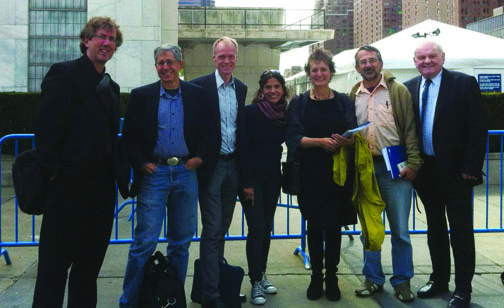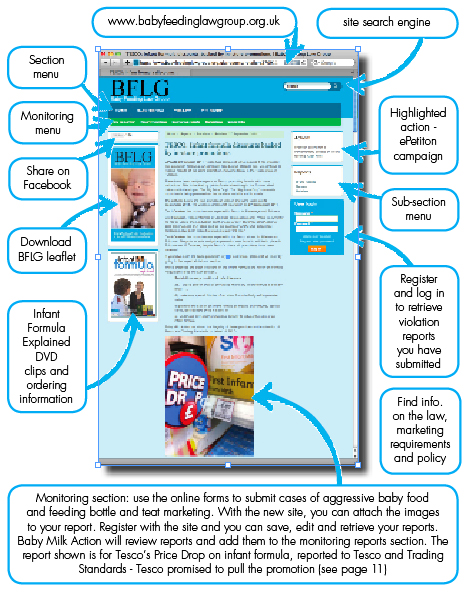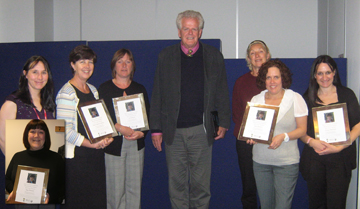Update 44
News Roundup
Creating new markets: ‘Growing up’ and ‘Toddler’ milks
As more countries are clamping down on follow-on milk advertising, companies are building new markets for formulas for 1-5 year--olds. EU policy makers are in a quandry - aware that this is a marketing scam and that there is no evidence that fortified formulas for older babies are needed, but unable or perhaps unwilling to ban them. Young children need to eat real foods ideally alongside continued breastfeeding. Infant formula can go on being used after 6 months. The new formulas invariably share brands and logos with infant formulas, so promote the whole range. They are also expensive and with high levels of sugar, increase the risk of obesity. But the alluring claims trigger fears in parents that real foods miss essential nutritents.
● A report by the German Federal Institute for Risk Assessment (BfR) (16.08.2011) found that ‘toddler’ milk does not offer any advantage compared to reduced fat cow milk. “From a nutritional and physiological point of view these special toddler milks are not necessary”, says BfR President, Professor Dr. Andreas Hensel. "The manufacturers of toddler milk drinks often refer to high consumption amounts on the packaging of their products. According to these recommended consumptions children would consume through children's milk alone high amounts of macronutrients and micronutrients. Within the framework of the overall diet this would favour in the long-term an oversupply with all nutrients. From a nutritional physiological and health point of view this is problematic."
● The italian consumer association Altroconsumo analysed these products and published a statement very similar to the german one in 2009. CLICK Here for the Report in Italian For the French HERE
● A survey in 2010 by the Hong Kong Department of Health (HKSAR) found that “children who drank more milk (mainly formula milk) than the recommended volume generally consumed smaller amounts of grains, vegetables and fruits. Use of the bottle and parents’ misconceptions about the nutritional benefits of formula milk might have contributed to the high milk intake and the choice of milk.”
● Gooze et al, Prolonged Bottle Use and Obesity at 5.5 Years of Age in US Children J Pediatrics 2011, Sept; 159 (3):431-6
- A survey by the German consumer centres on the products being sold as “Kindermilch” (“milk for children”) targeting the age from 12 months found that Kindermilch was up to four times more expensive than normal milk, costing parents up to 245 euros more each year. http://www.vzhh.de/ernaehrung/129727/kostenfalle-kindermilch.aspx
- CLICK HERE for a PDF of the report Fortified Milks for Children by First Steps Nutrition Trust. Page 61 (Table 17) is a chart showing the amount of sugar in Growing Up milks
- http://www.firststepsnutrition.org/pdfs/Fortified%20milks%20-%20FINAL.pdf
The promotional leaflet for Nestlé’s Nan formula range shown below has been distributed to health facilities in Armenia -- a higher risk country according to Nestlé and where it says it follows the International Code.
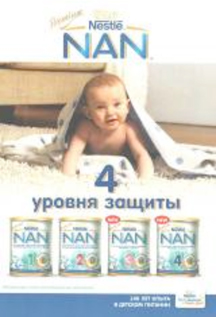
The No 3 version for one-year-olds has the same name and branding as the infant formulas from birth and is advertised on a Russian TV Channel on Armenian cable.
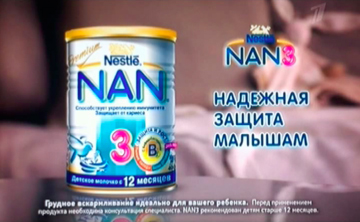
There are promotions like this and worse all over the world.
Baby Milk Action supporters have been asking Nestlé to stop these violations in the ongoing Email Nestlé campaign.
Breastfeeding in the 2nd year of life can provide 29% of energy requirements, 43% of protein, 75% of Vitamin A, 76% of Folate, 94% of Vitamin B12 and 60% of Vitamin C. Dewey. KG. Nutrition, Growth, and Complementary Feeding of the Breastfed Infant. Pediatric Clinics of N.American. Feb 2001;48(1).
South African law - at last?
The South African Department of Health has launched a new consultation on the long-awaited and much-needed Regulations Relating to Foodstuffs for Infants and Young Children. Find our comments on this link before the deadline of 2nd May: http://info.babymilkaction.org/southafrica
http://www.doh.gov.za/show.php?id=3439
http://www.doh.gov.za/docs/foodcontrol/comments/2012/infants_regs.pdf
Prof Michael Latham dies
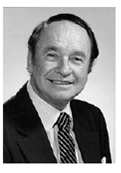 Prof. Michael Latham, a longtime friend of Baby Milk Action and IBFAN, one of the giants in the long struggle to protect breastfeeding from commercial misinformation, died in Boston,1st April 2011 at 82. Michael was always focused on the latest threats to infant health and just a few months before he died co-authored a key article about the importance of breastfeeding after 6 months and the risks of reliance on fortified foods.
Prof. Michael Latham, a longtime friend of Baby Milk Action and IBFAN, one of the giants in the long struggle to protect breastfeeding from commercial misinformation, died in Boston,1st April 2011 at 82. Michael was always focused on the latest threats to infant health and just a few months before he died co-authored a key article about the importance of breastfeeding after 6 months and the risks of reliance on fortified foods.
RUTF stuff. Can the children be saved with fortified peanut paste
World Public Health Nutrition www.wphna.org/
European MEPs campaign to stop claims and formula ads
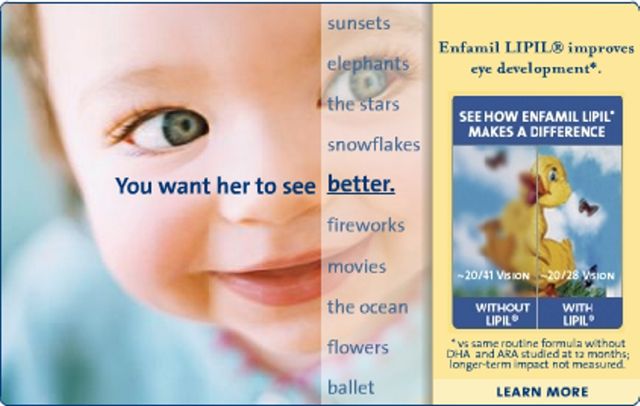
BOGUS HEALTH CLAIMS
Our campaign to stop promotional claims on foods for infants and young children came to a head in March 2011 with a vote in the EU Parliament. 328 MEPs from all parties (a majority) tried to stop the following claim appearing on follow-on formulas: “DHA intake contributes to the normal visual development of infants up to 12 months of age.” However, because 57 MEPs were not present, an absolute majority was not reached so the claim could not be stopped.
Glenis Willmott MEP, who led the challenge said:
“Today a majority of this parliament voted against this health claim. Clearly it is a disappointment not to get the number of votes we needed, but this result still sends a strong message that there is deep unease about health claims of this sort.”
UNICEF & Save the Children joined the many NGOs and researchers around the world who opposed the claim. The World Health Organisation clarified its position about DHA:
“WHO does not have a recommendation about the addition of docosahexaenoic acid (DHA) to formula milk.....to date no solid evidence exists to be able to say that adding DHA to infant formula will have important clinical benefits. Were WHO to give such a recommendation, it would have to follow a strict guideline development process based on grading of all available evidence collected through systematic reviews by expert panels free from conflict of interest.”
CONFLICTS OF INTEREST & SCIENCE
The DHA debate helped MEPs understand our concerns about the scientific evidence used in the authorisation of claims and our worries about the European Food Safety Authority (EFSA), the European Commission and the lack of transparency in EU policy formation generally. Not only did members of the EFSA Working Group evaluating the claim have unacceptable conflicts of interest, but EFSA admitted that it could not have reached its conclusion “without considering the studies claimed by the applicant as proprietary.” No wonder when no consistent, independent and systematically-reviewed evidence of a causal relationship for DHA fortified formulas exists.
EFSA has since carried out a review of its policy on conflicts of interest and the new rules address many of our concerns. However EFSA’s role, its Management Board (one of whom has worked for the Danone Institute for 10 years) and the claims approval process are embedded in a complex mix of EU regulations geared to promoting EU trade and tricky to fix.
http://info.babymilkaction.org/EFSA
A CHANCE TO CHANGE THE RULES
A Framework Directive called PARNUTs that has governed baby food policy making for two decades will soon be replaced by a new Regulation which will abolish the concept of ‘Dietetic Foods’. With MEPs we are calling for more transparency, accountability and protection of child health. The call from Green MEP Carl Schlytter that: “Advertising of infant formulae, follow-on formulae and of any other kind of food intended for infants or young children shall be prohibited.... “ did not get through, but MEPs are still hoping to extend the controls on infant formula advertising to follow-on formulas and to allow Member States to restrict or prohibit all advertising.
Discussions are continuing with a Plenary vote expected in Strasbourg in April. Do check this weblink to see how you can help.
http://info.babymilkaction.org/parnuts
Monitoring project stops illegal Tesco promotion
Baby Milk Action began to receive reports of a Tesco “Big Price Drop” promotion on infant formula at the end of September and posted a report on the new BFLG website. We also contacted Tesco and Trading Standards.
Tesco contacted us a few days later (3 October):
“The Baby Milk lines were accidently included in a list of price drop lines. This was identified on Saturday by the business ahead of the campaign launching on Monday.... There is currently no red or yellow price reduction point of sale or any “Big Price Drop” point of sale either on line or in store and we are confident all the due diligence measures have been issued to stores to prevent this.”
All well and good - except further reports of the “Big Price Drop” point-of-sale promotional materials continued to come in until 20 October.
Despite this Trading Standards seem to be satisfied with Tesco simply apologising for what is criminal activity: a violation of the Infant Formula and Follow-on Formula Regulations.
This is not the first time Tesco has apologised for breaking the law. In 2009 it illegally advertised SMA infant formula on its website with club card points and in its catalogue, where it promoted the formula as having “the healthiest nutrients”. Again, it claimed this to be an inadvertent mistake. In 2005 it admitted that in-store promotional staff refer to infant formula, again prohibited by law.
If Trading Standards took retailers to court for breaking the law - particularly for repeat offenses - and courts levied the applicable fines of thousands of pounds per incident then perhaps they would learn to stop making ”mistakes” and save the rest of us time and money reporting them.
Infant Formula Explained films provide independent information
Baby Milk Action produced the DVD Infant Formula Explained with MarkIt TV on behalf of the Baby Feeding Law Group. The main 25-minute programme features experts explaining about formula to give health workers the information and the confidence they need to answer questions from parents and carers (extract below).
A shorter 7-minute programme is for use with carers and parents who have decided to formula feed (and health workers with less time available). There is also a 10-minute film on how to make up powdered formula in line with World Health Organisation guidance to reduce the risks from possible contamination with harmful bacteria (you can watch an extract online).
The DVD is suitable for use in UNICEF Baby Friendly Initiative accredited hospitals and is purchased with a public-performance licence allowing it to be used with groups of health workers and for health workers to use with parents and carers who have decided to use formula.
The DVD has already been purchased for use by individuals, hospitals, PCTs and universities. Although some of the information is UK specific, it has also been purchased for use in other parts of the world, including North America, Australia and Hong Kong.
Julie Crawford Award goes to IFIT health visitors
The Julie Crawford Award for Breastfeeding Support for 2011 was won by 6 health visitor representatives on the Infant Feeding Information Team of Blackpool and North Lancashire (IFIT).
Left to right: Sarah Saunby (one of the Julie Crawford Award judges), ,Julie Carter Lindsay (Blackpool), Jo Dobson (Fylde), the late William Bingley (Chair of NHS North Lancashire), Kathleen Freear (Lancaster), Sue Anslow (Wyre) and Nicola Kemp (Wyre). Inset: Sam Whittle (Lancaster). Photo credit: Baby Feeding Law Group (click for a large version).
One of the judges, Obi Amadi, Lead Professional Officer, UNITE/CPHVA, said:
I am delighted to see how the winning health visitor representatives have been key to IFITs success, helping create a fantastic model that I hope will be picked up by other regions throughout the UK. The team has shaped IFIT’s agenda and improved communication. In just four years IFIT has markedly reduced reliance on information from baby milk companies. IFIT has also done so much to ensure that good quality generic information about formula feeding is “out there.”
• The Julie Crawford Award for Breastfeeding Support is an award given by the BFLG to Health Visitors and Health Visitor Teams who have made a significant contribution to the protection of breastfeeding and who facilitate universal access to support that is free from commercial influence. The Award was set up in memory of Julie Crawford, a health visitor and a former Director of Baby Milk Action who died from a rare disease, at the age of 42 in November 2001.
Hot Milk - critical analysis of company research reveals unwarranted claims
IFIT produces a bulletin on infant feeding for health workers called Hot Milk. IFIT also features alongside other experts in the educational DVD, Infant Formula Explained, produced by Baby Milk Action on behalf of the Baby Feeding Law Group (BFLG) (page 11). The November 2011 Hot Milk reports:
We have repeatedly requested evidence supporting all new formula developments to be sent in advance of IFIT meetings, and it is only recently that this has started to happen...
Most studies claim only to show that there may be some benefit, but basic analysis of research protocols often shows that even that claim is unwarranted on the evidence. One even admitted that a product may have “decreased benefit” (i.e. risk of harm) for some babies. Formula studies supplied have included babies who have been initially breastfed for varying, sometimes undisclosed, periods, yet the formula is being marketed as safe for all babies from birth, despite the importance of initial gut colonisation.
This explains why IFIT has not simply passed on company claims in Hot Milk, and so lent our credibility to company marketing efforts. One company has expressed frustration that IFIT has not done so, and stated in writing its intention to ignore the Trust policy of not visiting individual staff.
Children’s Rights and Business Principles
Our concerns about the Global Compact grew in 2011 when Save the Children and UNICEF joined forces with the UN Global Compact Office on a new Children’s Rights and Business Principles Initiative (CRBPI). The CRBPI aimed to a framework for business actions wherever they affect children’s rights in the workplace, marketplace, community and environment.
While welcoming these aims, we feared that the fundamental flaws in the draft CRBPI proposals would actually do more harm than good - providing businesses with yet another opportunity to simply look good while continuing practices that threaten child survival and health. Along with other NGOs, we called on Save the Children and UNICEF to:
- disengage from the UNGC;
- integrate strong accountability measures (including independent monitoring of marketing and other business practices), and
- focus on business’s obligation to repect child rights and governments’ obligations to regulate them.
We also feared that the CRBPI focus on partnerships and self-monitored legally non-binding commitments as the “unifying framework for existing and future initiatives” pre-empted the forthcoming General Comment on Business and Children’s Rights by the Committee on the Rights of the Child, which is in consultation now. The final comment is due in 2013 and will focus on State Parties’ obligations - as the duty bearers of children’s rights - to protect, respect and fulfill children’s rights and to regulate the impact of business on children. The primary obligation of private actors is to respect these rights - not to co-opt governments’ responsibilities.
We attended the launch of the final Business Principles in March 2012 and were relieved that although not all our concerns were addressed, the Principles were much improved. Business’s were called on to: ‘Not undermine government efforts to protect and fulfill children’s rights’ including using taxation to generate the revenues needed.
The weak draft wording to: “Use marketing and advertising that advances children’s rights” was changed and now calls on business to ensure “that communications and marketing do not have an adverse impact on children’s rights" and to “comply[ing] with the standards of business conduct in World Health Assembly instruments related to marketing and health in all countries” (specifically mentioning the International Code and subsequent relevant WHA Resolutions and the WHO Recommendations on the Marketing of Foods and Non-alcoholic Beverages to Children).
See:
http://info.babymilkaction.org/CHILDRENandBusiness
The United Nations corporate responsibility scheme fails the integrity test
No action taken over “patron sponsor” Nestlé for violating Principles
The United Nations Global Compact (UNGC) is a voluntary initiative that is supposed to improve the behaviour of companies that sign up to it. However, more than two years after Baby Milk Action registered complaints that Nestlé is systematically breaking its commitments to the UNGC Principles, the UN Global Compact Office (GCO) has still to take the action called for under so-called Integrity Measures, stressing that its role is to “promote dialogue”.
We are not alone in our concerns about the UNGC. In 2010, the UN’s Joint Inspection Unit found serious failings when it carried out an evaluation of the GCO. The GCO rejected the report as flawed (see below).
Having copied the GCO into our ongoing correspondence with Nestlé for over two years, we asked the GCO to take other action called for in the Integrity Measures, which state:
“The Global Compact Office would be available to provide guidance and assistance, as necessary and appropriate, to the participating company concerned, in taking actions to remedy the situation that is the subject matter of the allegation in order to align the actions of the company with its commitments to the Global Compact principles.”
The GCO responded saying that it can ONLY “facilitate adherence to the principles of the Global Compact through openness and enhanced communication.” (ie forward our letters to Nestlé onto Nestlé a second time.) That is all. However, the Integrity Measures allow it to do much more:
“The Global Compact Office may, in its sole discretion, take one or more of the following steps, as appropriate... Refer the matter to one or more of the UN entities that are the guardians of the Global Compact principles for advice, assistance or action”.
Nestlé disputes interpretation of the UN Resolutions and as the GCO says it is not qualified to evaluate Nestlé’s comments or its reports posted on the GCO site - it should consult UN legal experts - but will not do so.
The Integrity Measures call for a review which can lead to the company being excluded from the initiative if dialogue does not resolve the issue.
Pressed on why it will not conduct this review, the GCO responded to Baby Milk Action, “As you well know, the Global Compact Office is not an adjudicatory body.”
We asked the GCO to clarify why it was not taking the actions set out in the Integrity Measures - and it responded, “we do not plan to provide a point-by-point response.”
We have sent our list of questions of the UN Secretary General asking for assistance (we asked the GCO to pass our letter to its Board through its usual channels, but it refused to do so).
Update 29 March 2012: Baby Milk Action has released the letter sent to the UN Secretary General - click here.
The GCO has told us in previous correspondence that not a single company has been excluded from the Global Compact following a complaint by a civil society organisation under the Integrity Measures.
Conflicts of interest - follow the money
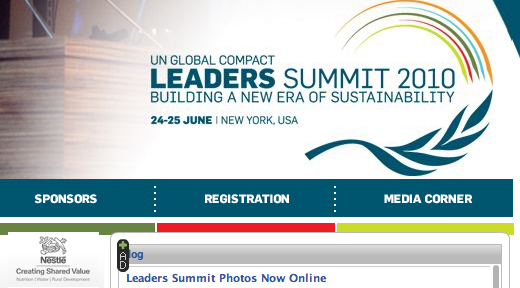
Nestlé was one of three patron sponsors listed on the title page for the UN Global Compact Leaders Summit in New York in 2010.
Meetings with Nestlé executives - where the Global Compact Office could help
Baby Milk Action meets with Nestlé executive at fora such as the EU Platform for Action and the company’s shareholder AGM. We are in ongoing correspondence regarding violations of the baby food marketing requirements - communicating in writing ensures accuracy and a documentary record. We have proposed meeting directly with executives under a four-point plan that could ultimately lead to the end of the boycott. For this meeting to take place, we first require Nestlé to state that it accepts the validity of the International Code and Resolutions adopted by the World Health Assembly and that it needs to make changes to its marketing practices. It refuses to do so, instead suggesting a meeting with no clear purpose. In the past, Nestlé has misrepresented such meetings by falsely claiming that it is “working in partnership” with its critics.
Nestlé most recently rejected the four-point plan in a letter dated 15 December 2011. Executives claim that the marketing requirements have been interpreted incorrectly. To make progress, we have proposed that Nestlé and Baby Milk Action meet before a panel of independent experts to resolve disagreements over interpretation. Nestlé refuses to even set out its terms and conditions for taking part in such a meeting (which would include how it can be reported to third parties).
The GCO has ignored our request for it to encourage Nestlé to engage with these proposals. Instead it is pressuring us to meet Nestlé without first agreeing the purpose of the meeting.
• We understand that Nestlé is attempting to arrange meetings about its baby milk marketing activities with what it terms “stakeholders”. We ask that anyone receiving an invitation encourage Nestlé first to contact Baby Milk Action to engage with the above proposals. If Nestlé is not prepared to do so, its intentions should be questioned.
Summary of the main findings of the UN’s Joint Inspection Unit:
- The GCO has no clear mandate and lacks a long term strategy and clear targets. There are no clear entry criteria and no screening of members.
- There is a lack of transparency and effective monitoring system.The reporting mechanism consists in a self-assessment exercise that fails to provide effective monitoring or verification of the principles.
- The GC has drawn reputational risks for the UN organizations involved in it because of the risks associated with the use of the UN brand by companies who do not have to prove conformity with UN core values.
- The Inspectors recommend that Member States should be involved and that the UN General Assembly needs to guide the Secretary General in better delineating a clear mandate for the GCO, “so as to prevent a situation whereby external actors may divert attention from agreed strategic goals to promote interests that may damage the reputation of the United Nations”.
- “The Secretary-General, in his capacity as Chairman of the Global Compact Board, should submit to the consideration of the Board concrete measures to reinforce accountability in the implementation of the Integrity Measures, including (a) closer scrutiny of [company reports] by local networks and civil society... (d) more proactive and transparent handling of complaints.”
The Role and Functioning of the Global Compact: JIU/REP/2010/9):
http://www.unjiu.org/data/reports/2010/JIU.REP.2010.9_For%20Printing_17%20January%202011.pdf
FTSE4Good rules change to accept code breakers
In September 2010, FTSE, the stock exchange listing company, weakened its Breastmilk Substitutes (BMS) criteria to allow companies to be included even while violating the International Code of Marketing of Breastmilk Substitutes and national legislation. Nestlé, was excluded under the previous criteria, but was added to the FTSE4Good Index in March 2011.
During his visit to the UK in February, IBFAN Asia’s Regional Coordinator, Dr Arun Gupta, came with us to discuss our concerns about the FTSE process with Mark Makepeace, the CEO of FTSE, following earlier correspondence.
Weakening the criteria
FTSE now assesses companies against their stated policies rather than against the International Code and Resolutions. Nestlé considers that only 3% of the allegations in IBFAN’s Breaking the Rules, Stretching the Rules 2010 report require action, the rest it consider to be in compliance with its own policy. Page 19 has a comparison of Nestlé’s policy with the International Code, showing 12 key differences.
In June 2011, FTSE explained why the new standards made it easier for companies to be included in the Index: “In the infant food sector we were not able to engage the companies as they were all being excluded from the index.” However, FTSE refuses to accept that this is a weakening, and promotes its criteria as almost stronger than the Code: “The FTSE4Good Breast Milk Substitutes marketing inclusion criteria build on the WHO Code, but in addition to criteria requiring company policies to be aligned with the WHO Code it goes further by assessing how a company implements this in practice.”
We ask: How can FTSE claim to ‘build on the WHO Code’ when it is not using the whole Code as a minimum?
On the advice of a commercial auditing firm and “those we are collaborating with” two countries with exemplary legislation were chosen for investigation and Nestlé was forewarned. Mark Makepeace again explained, “we will not be asking the assessors to act as a judge with regards to specific allegations, but rather to assess whether the companies’ practices on the ground are in-line with THEIR stated policies.” [Emphasis added].
We ask: Why is FTSE looking in the wrong places, forwarning the companies and not assessing violations?
FTSE’s Conflicts of Interest
We also raised concerns that the BMS Committee advising FTSE has members with serious conflicts of interest. For example:
- The Methodist Central Finance Board and the Church of England both have financial interests in the Nestlé’s business as shareholders and so profit directly from its business activities. In addition, they have faced criticism from their church members about these investments. Similarly, the United Reformed Church Mission Committee faced criticism from church members when it dropped its opposition to investing in Nestlé on the basis of the FTSE4Good listing. Organisations that may have an interest in having a company included in the FTSE4Good Index cannot be independent when it comes to defining the procedures for including that company.
- The Public Private Partnership, Global Alliance for Improved Nutrition (GAIN), works with over 600 corporations and provides them with opportunities “to improve corporate reputation, increase their brand equity, and increase staff motivation...” GAIN part-funded FTSE’s assessments of Nestlé in India and Zambia (see below). See Page 16 for how GAIN tried to influence trade rules at Codex in order to allow promotional claims on baby foods - claims prohibited by Indian law - and funded a proposal for a bad monitoring scheme.
- In 2007 and 2008 Nestlé was a participant and the “lead sponsor” of a conference on Corporate Responsibility instruments organised “as a joint venture between Chatham House and FTSE Group.”
Illegal sponsorship & labelling
Nestlé has been allowed by FTSE to get away with illegal sponsorship of health workers in India. In its response to FTSE, Nestlé defends the sponsorship, ignores the WHA Resolutions and the Indian Government which confimed on the 7th March 2012 that, “In our opinion, which has been clearly expressed in our letter dated 17 August 2010, such activities violate the Infant Milk Substitute, Feeding Bottles and Infant Foods Act 1992, and Amendment Act 2003”
Article 9.2 of the Indian Law states: “No producer, supplier or distributor referred to in sub-section (1), shall offer or give any contribution or pecuniary benefit to a health worker or any association of health workers, including funding of seminar, meeting, conferences, educational course, contest, fellowship, research work or sponsorship.”
Nestlé infant formula currently on sale in India with claims and other illegal labellling

The Indian Law forbids “pictures or other graphic material or phrases designed to increase the saleability of infant milk substitutes or infant food.”
Nestlé’s Nan 1 infant formula on sale now and at the time of FTSE’s research, claims to support ‘the immune system’ ‘healthy gut flora’ and ‘natural defences’ and ‘contribute to the development of brain and vision.’ Such labels are seen millions of times and hide the fact that the product will greatly increase the risk of ill health.
Misusing the FTSE4Good name
Nestlé misrepresents what inclusion in the FTSE4Good Index means. For example: Catherine O’Brien, Director of Communications, Nestlé Canada Inc. said in the Edmonton Journal, March 2012:
“With regard to breastfeeding, Nestlé is committed to fully complying with the World Health Organization’s code of marketing of breast-milk substitutes and applying it as a minimum standard in the countries defined by UNICEF with high child mortality and malnutrition rates. We have been independently recognized as having the industry’s toughest system to enforce the WHO code, and in March 2011 we were the first infant formula manufacturer to be included in the FTSE4Good index, which measures the performance of companies that meet globally recognized corporate responsibility standards.”
In March 2011 UNICEF UK said:
“The evidence available to us suggests that all breastmilk substitute manufacturers currently violate the International Code routinely. We are therefore following the inclusion of Nestle on the index carefully and will be looking for evidence that their marketing begins to comply with the Code.”
In April, a UNICEF HQ told Dairyreporter “I can confirm that Nestle violates the code.”
See Page 17 for Nestlé AGM.
IBFAN’s recommendations to the FTSE BMS Committee:
- Reconsider the decision on Nestlé on the basis of the evidence provided and Nestlé’s inadequate response.
- Review the criteria for membership to ensure that all members are free from conflicts of interest in relation to infant and young child feeding.
- Review the assessment process to ensure that companies systematically violating the International Code and Resolutions cannot be listed.
- Ask UNICEF HQ’s opinion on: the new FTSE criteria; whether GAIN should be excluded from defining the procedures for including companies in the index
- Clarify the role of UNICEF UK and the appropriate use of the name UNICEF.
- Make the Assessment Report public.
- In the meantime, make a clear statement that under the current criteria companies that systematically violate the Code and Resolutions can be included in the FTSE4Good Index.
What role for BINGOs and PINGOs?
WHO gets tougher
Alongside another new coalition, Democratising Global Health, we used the COI Statement in follow-up discussions before and during the WHO Executive Board in January 2012. Dr Chan, WHO’s Director General, is now making it much clearer that the Private Sector should not be present at any WHO meetings setting ‘norms and standards’.
A Draft Resolution on NCDs was adopted containing two strong references to Conflicts of Interest. In the debates about WHO Reform Member States called for WHO’s independence and integrity to be protected from “undue influence by those with vested interests.”
Breastfeeding targets
Global Targets for maternal, infant and young child nutrition will also be on the agenda of the World Health Assembly this year and were discussed already in January. One target calls on governments to “increase exclusive breastfeeding rates of infants under the age of six months to 50% at global level.” Another requests the WHO Director General to “develop guidelines on the marketing of complementary foods.”
Picking the right partners
The Roll Back Malaria Partnership is often cited as a good model of a Public Private Partnership. But is it appropriate for the NCD problem which is largely corporate-led? Surely no-one would partner a mosquito?
Rio Declaration on health inequalities betrays the promise to ‘close the gap in a generation.’
The WHO World Conference on Social Determinants of Health issued the Rio Declaration on 21 October 2011. Baby Milk Action joined other civil society organisations at the meeting to call on government representatives to counter what WHO’s own expert Commission called “the toxic combination of poor social policies, unfair economic arrangements and bad politics that results in the unequal distribution of health-damaging experiences” in its report “Closing the Gap in a Generation.”
Few of the concrete proposals from the WHO Commission made it into the official Declaration, though many were picked up in an alternative civil society declaration coordinated by the People’s Health Movement (PHM).
Professor David Sanders of the University of the Western Cape and PHM received a standing ovation during the final discussion panel on the closing day of the conference after questioning why trade, climate change, the brain drain of health workers from developing countries to rich countries and other issues have been totally ignored in the official Rio Declaration.
The official Rio Declaration calls for collaboration with stakeholders, including the private sector. However, after the Conflicts of Interests Coalition statement was distributed to delegates, two more references related to the need to safeguard against conflicts of interest were included in the declaration - click here for full details.
- Contact Baby Milk Action to add your organisation's name to the Conflicts of Interests Coalition statement.
Regina Da Silva, Sonia de Oliveira Brady and Mike Brady with the Rio Declaration and the Conflicts of Interest Coalition statement of concern
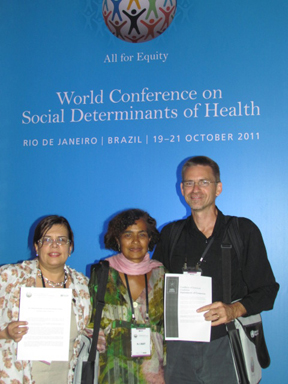
UN and business
UN General Assembly tackles corporate-led diseases by snuggling up to business
In the course of 2011 Baby Milk Action was instrumental in bringing over150 Public Interest NGOs (PINGOs) together to call on the United Nations to stop businesses and their front organisations - Business Interest NGOs (BINGOs) - influencing and weakening health policies, an overarching issue that IBFAN has focussed on for decades at the World Health Assembly, Codex and elsewhere.
During 2011, the World Health Organisation (itself going through a major reform process) held meetings in Moscow and Geneva and, with the United Nations, in New York culminating in the High Level Meeting of the General Assembly and the creation of a Political Declaration on the Prevention and Control of Non-Communicable diseases (NCDs) - diseases such as cancer, heart and lung disease and obesity, that are largely caused, or made worse, by the marketing of foods, drinks and tobacco. These same industries were out in force at all the events under the ‘Civil Society’ umbrella - and hosting “Pepsi Breakfasts” and side meetings and presenting themselves as the natural ‘partners’ that can be trusted to help solve the NCD problem voluntarily. With so much money around and some industry-funded NGOs also promoting Public Private Partnerships (PPPs), these ‘voluntary’ softly-softly solutions sounded alluring to cash-strapped governments who are already facing opposition when implementing the Framework Convention on Tobacco. But as the massive costs for treating NCDs kick in, governments must take effective action soon.
In this context it was a challenge to get wording into the Political Declaration that explained the risks of partnerships with businesses that have a vested interest in the outcome and why the ‘voluntary’ approach could waste time, money and even make matters worse. The final text contains no explicit reference to conflicts of interest except in relation to tobacco. However, much of the problematic wording about private sector involvement in Monitoring and Evaluation was removed, and new wording about the need to control marketing of baby foods (Para 43i) and junk foods (Para 43f) was added.
The Conflict of Interest Coalition Statement endorsed by over 150 NGOs
Protect Health not corporations sticker brought along by El Poder del Consumidor, Mexico
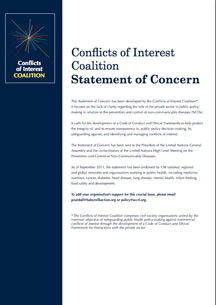
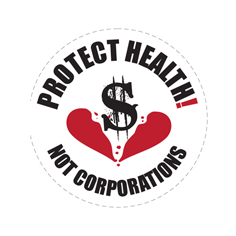
Patti Rundall at the UN Interactive Civil Society Hearing, 16 June 2011
“When you have a multi-stakeholder panel, you inevitably lower your standards. I don’t think we would have got anywhere with infant feeding if we had had to do that, if the UN System had to bring its standards down to meet what the industry wants.”
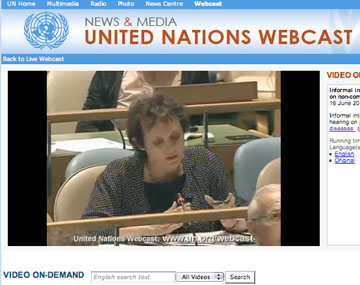
Conflict of Interest Coalition members at the High Level Meeting, UN General Assembly, New York, Sept, 2011
From the left: Bill Jeffrey, CSPI Canada, George Hacker Global Alcohol Policy Aliance (GAPA, USA), Oystein Bakke (GAPA, Norway) Xaviera Cabada Barrón and Alejandro Calvillo (El Poder del Consumidor, Mexico) either side of Patti Rundall (UK), Derek Rutherford (GAPA, UK).
